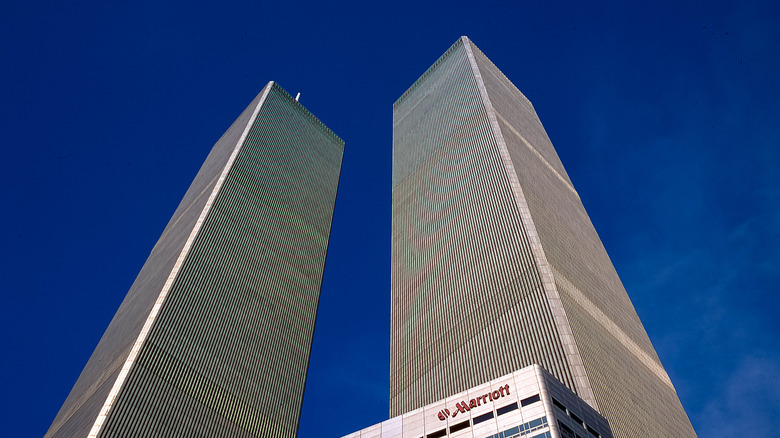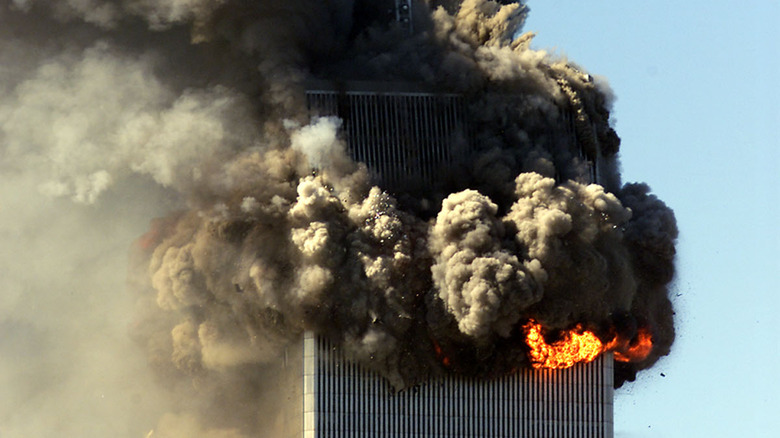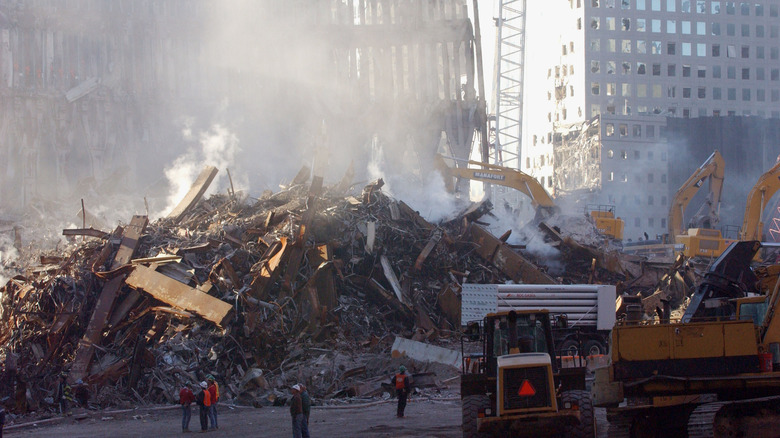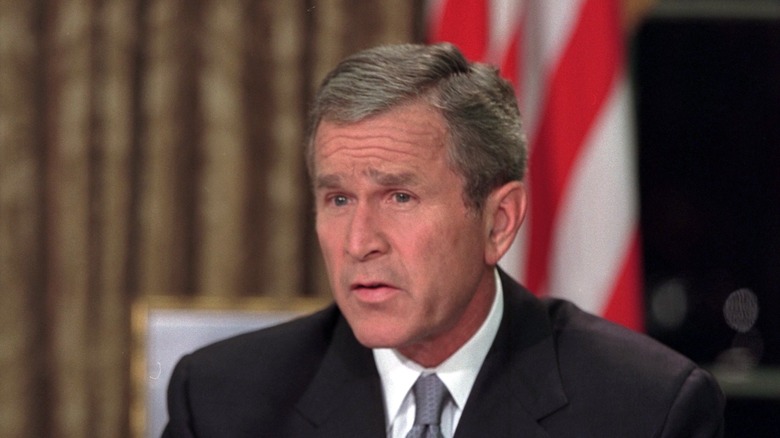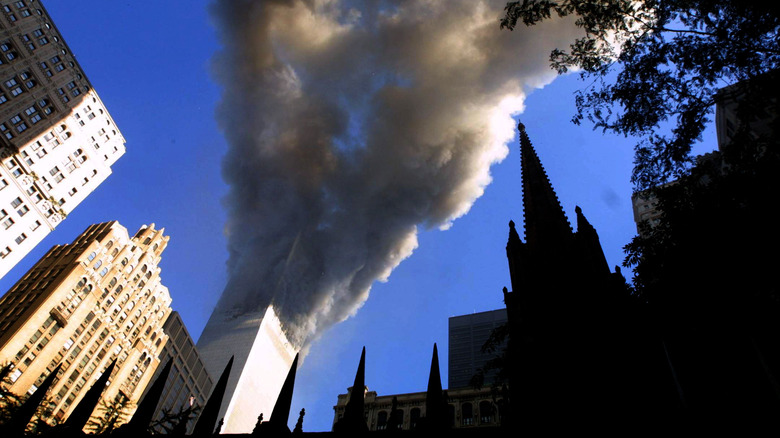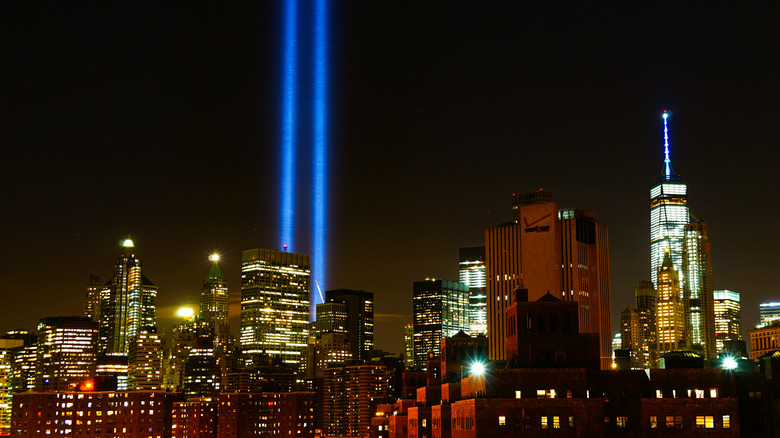Myths About 9/11 You Need To Stop Believing
For those of us old enough to remember, September 11, 2001 was a day when everything changed. Over the course of a few hours, while news of horrific terrorist attacks employing hijacked commercial planes on U.S. soil was broadcast around the world, the optimism of the new millennium seemed to dissipate a little more with each new detail, as politicians and security experts attempted to piece together how the attack had happened — and why.
The intelligence community soon came to a consensus: that Al Qaeda — the Middle Eastern militant organization and terror group who had claimed responsibility for the events of 9/11 — was indeed behind the attacks. Orchestrated at the behest of their leader Osama Bin Laden, the group had been mistakenly convinced that such devastating atrocities would compel the U.S. to withdraw from Middle Eastern territories, according to The Washington Post.
But though the official version of events made perfect sense, 9/11 — like many major news events — also attracted plenty of myths, conspiracy theories, and bogus reports. Here are those that, with 20 years of hindsight, it is time to finally put behind us.
Myth: Burning jet fuel couldn't bring down the Twin Towers
Maybe it was because the images of destruction — especially those of the two hijacked planes hitting the World Trade Center in New York — were so shocking as to seem almost unreal, that in the days following the 9/11 terror attacks, conspiracy theorists grew to speculate that the version of events that had dominated the headlines of new stations around the world was not, in fact, the whole truth.
As noted by The Guardian, one of the most pervasive theories doing the rounds — one which continues to enjoy traction on the fringes of the internet even today — was that the impact of the planes alone was not the cause of the destruction. Conspiracy theorists claim that neither the impact of the planes nor the explosive fire that followed would be enough to down the Twin Towers: jet fuel, they argue, doesn't burn at a high enough temperature to melt steel, and therefore the towers fell as a result of a controlled explosion.
"The fire is the most misunderstood part of the WTC collapse," claim engineering experts Thomas W. Eagar and Christopher Musso in a paper published in The Member Journal of The Minerals, Metals & Materials Society, and argue that the theory in question has partly come about as the result of a misunderstanding of the differences between heat and temperature. Similarly, Popular Mechanics has demonstrated that the steel wouldn't even need to "melt," but simply to lose its structural integrity amid the heat for the towers to fall.
Myth: 7 World Trade Center was destroyed by a controlled explosion
"It's very hard to document where the fuel went, but if it's atomized and combustible and gets to an ignition source, it'll go off," said combustion expert Foreman Williams concerning the destructive power of the planes' jet fuel during the 9/11 attacks on the World Trade Center (via Popular Mechanics).
But another building also collapsed in New York that day: World Trade Center 7, an office building at 250 Greenwich Street that tumbled to the ground seven hours after the Twin Towers ... unlike the buildings around it. This and the fact that nothing struck the building externally attracted rumors that this building, too, had been destroyed in a controlled explosion.
According to Shyam Sunder, a chief investigator into the events of 9/11 at the National Institute of Standards and Technology (via Popular Mechanics): "[W]e found ... that there was, in fact, physical damage to the south face of building 7 ... about a third of the face to the center and to the bottom — approximately 10 stories — about 25 percent of the depth of the building was scooped out." The unusual design of WTC 7 also apparently contributed to the building's "progressive" collapse; Sunder notes that damage to just a single supporting column of one of the lower floors was enough to cause a catastrophic collapse.
Myth: Al Qaeda's imminent nuclear threat
Within hours of the 9/11 terror attacks, it became increasingly obvious that the U.S. was already beginning to ready itself for what would be a sweeping campaign of retaliation in the Middle East. "The search is underway for those who were behind these evil acts," said President George W. Bush in his address to the nation. "I have directed the full resources of our intelligence and law enforcement communities to find those responsible and to bring them to justice" (via American Rhetoric).
But post-9/11 U.S. foreign policy wasn't simply fueled by a desire for revenge; following such a devastating and highly visible attack on home soil, the U.S. government was now tasked with reacting to the new climate of fear by demonstrating that it was doing everything in its ability to ensure nothing on such a scale could ever happen again. And paranoia was at an all-time high when an anonymous source leaked intelligence that Al Qaeda was in the process of smuggling nuclear weapons into the U.S. with the intent of committing a bigger atrocity.
Per the same source, even as late as 2008 — when numerable foreign powers were developing known nuclear weapons programs — CIA Director Michael Hayden still insisted that the "number one nuclear concern" in terms of the safety of the U.S. was that posed by Al Qaeda. However, such fears have proven groundless, and there has been no evidence that Al Qaeda ever had such capabilities, as The Washington Post has noted.
Myth: Israel's involvement in 9/11
It was one of the earliest — and ugliest — urban legends to emerge in the aftermath of the 9/11 terror attack, as evidenced by the publication of a Snopes investigation debunking the rumor as early as September 21, 2001. 4,000 Jewish people who worked at the World Trade Center had called in sick on the day of the attacks, went the rumor, which Snopes reports emanated within 24 hours of the attacks from the Syrian-owned Al Thawra newspaper. The story was seen by enemies of Israel as evidence that the country had foreknowledge of the attacks, or had even been a collaborator.
The story was, of course, utterly baseless, a mangling of an article in the Jerusalem Post on the hundreds of Israeli citizens missing on 9/11, that claimed: "The Foreign Ministry in Jerusalem has so far received the names of 4,000 Israelis believed to have been in the areas of the World Trade Center and the Pentagon at the time of the attacks."
The telling alteration of "Israelis" to "Jews" in many of the outlets — both in the mainstream media and online — demonstrates how even national tragedies may be weaponized by racists and ideologues to sow division at a time that instead calls for greater unity. Per Snopes: "the proportion of Jews among occupants of the World Trade Center who were killed in the 9/11 attacks was the same as their proportion of the general New York area population."
Myth: 9/11 was a complete surprise
Few people would argue with the fact that the terror attacks of September 11, 2001, were some of the most shocking world events in living memory. However, the shock of the day in question and the transformative effect the attacks had on both the U.S. and the wider world in the 21st century perhaps obscure the reality that, to some experts at least, the attacks were sadly foreseeable.
Brian Michael Jenkins, a world-renowned security and terrorism expert and author of "The Long Shadow of 9/11: America's Response to Terrorism," has argued in The Washington Post that the U.S. government's claim that the hijackings were a "new type of attack that had not been foreseen" was a falsehood. Hijackers had first threatened to crash a commercial plane into a target as far back as 1972, notes Jenkins, while the World Trade Center had been warned by a team of advisers as early as 1993 that the Twin Towers were a potential soft target for such an attack — Jenkins himself was one of those advisers.
